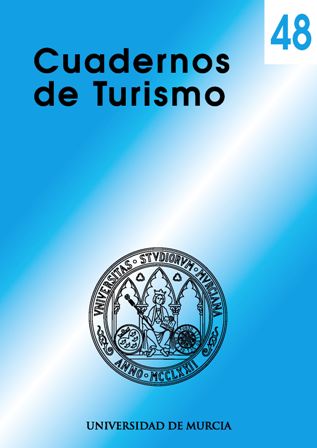HOW EXPERTS ASSESS STATISTICS REGARDING KNOWLEDGE ABOUT TOURISTS
Abstract
Knowledge of tourist behavior, based on the information generated and collected by both public and private management, is key for destination planning. Therefore, in this regard, it is essential to know the experts' opinions. Carrying out personal interviews with different players in the public administration, private companies and the academy has enabled finding actual needs and requirements of information regarding tourist behaviors, as well as reflecting on the necessity of the development of a public Tourist Information System.
Downloads
-
Abstract576
-
PDF (Español (España))781
-
PDF781
References
ÁLVAREZ-GAYOU J.L. (2003): Como hacer investigación cualitativa: fundamentos y metodología. México, Paidós Ibérica.
ANBALAGAN, K. y LOVELOCK, B. (2014): «The potencial for coffee tourism development in Rwanda – Neither black nor white», Tourism and hospitality Research, vol.14 (1-2), pp.81-96.
BERG, B.L. y LUNE, H. (2014): Qualitative Research Methods for the Social Sciencies (8ª edición). Harlow, Pearson Education Limited.
BLACKWELL, R., MINIARD, P.W. y ENGEL, J.F. (2002): Comportamiento del consumidor. México, Thomson.
ESCOBAR, A. y GONZÁLEZ, Y. (2011): Marketing turístico. Madrid, Síntesis.
GRAY J. y SZALAY E. (2007): eScience – a transformed scientific method. Presentation made to the NRC-CSTB. Disponible en: http://research.microsoft.com/en-us/um/people/gray/talks/NRC-CSTB_eScience.ppt.
GRETZEL, U., YUAN, Y. y FESENMAIER, R. (2000):«Preparing for the New Economy: Advertising Strategies and Change in Destination Marketing Organizations», Journal of Travel Research, vol. 39 (2), pp.146-156.
GUTIÉRREZ, J., GARCÍA-PALOMARES, J.C., ROMANILLOS, G. y SALAS-OLMEDO, M. H. (2017): «The eruption of Airbnb in tourist cities: Comparing spatial patterns of hotels and peer-to-peer accommodation in Barcelona», Tourism Management, nº 62, pp. 278-291.
HEY T. ET AL. (2009): The Fourth Paradigm: Data-Intensive Scientific Discovery. Redmond, WA, Microsoft Research.
HERNÁNDEZ CARRERA, R. (2014): «La investigación cualitativa a través de entrevistas: su análisis mediante la teoría fundamentada», Cuestiones Pedagógicas, nº 23, pp. 187-210.
HUETE NIEVES, R., MANTECÓN TERÁN, A. y MAZÓN MARTÍNEZ, T. (2008): « ¿De qué hablamos cuando hablamos de turismo residencial? », Cuadernos de Turismo, nº 22, pp. 101-121.
IVARS-BAIDAL, J.A., SOLSONA MONZONÍS, F.J. y GINER SÁNCHEZ, D. (2016): «Gestión turística y tecnologías de la información y la comunicación (TIC): El nuevo enfoque de los destinos inteligentes», Documents d’Anàlisi Geogràfica, vol. 62 (2), pp. 327-346.
KATAYAMA OMURA, R. (2014): Introducción a la investigación cualitativa: Fundamentos, métodos, estrategias y técnicas. Perú, Universidad Inca Garcilaso de la Vega.
LÓPEZ BONILLA, J.M. y LÓPEZ BONILLA, L.M. (2015): Manual de investigación de mercados turísticos. Madrid, Pirámide.
LÓPEZ PALOMEQUE, F. (2015). «Turismo y TIC. Notas sobre los procesos recientes de tecnificación de los destinos turísticos», en Libro Jubilar en Homenaje al Profesor Antonio Gil Olcina. Alicante, Universidad de Alicante, pp. 563-583.
LUQUE GIL, A., ZAYAS FERNANDEZ, B. y CARO HERRERO, J. (2015): «Los Destinos turísticos inteligentes en el marco de la inteligencia territorial: conflictos y oportunidades», Investigaciones Turísticas, nº 10, pp. 1-25.
MAYER-SCHÖNBERGER, V. y CUKIER, K. (2013). Big data: A revolution that will transform how we live, work, and think. New York, Houghton Mifflin Harcourt.
MERCADO ALONSO, I. y FERNÁNDEZ TABALES, A. (2016): «La percepción del paisaje urbano como indicador de sostenibilidad turística. El caso de Sevilla», en Blàzquez, M., Mir-Gual, M., Murray, I. y Pons, G.X. (Eds.). Turismo y crisis, turismo colaborativo y ecoturismo. XV Coloquio de Geografía del Turismo, el Ocio y la Recreación de la AGE. Mon. Soc. Hist. Nat. Balears, nº 23, pp.131-142.
MILES, M.B. y HUBERMAN, A.M. (1994): Qualitative data analysis: An expanded sourcebook(2a edition). Thousand Oaks, CA, Sage.
MOROZOV, E. El País: https://elpais.com/elpais/2015/12/17/eps/1450358550_362012.html [Consulta: 16 marzo 2017].
PEÑARRUBIA ZARAGOZA, M.P. (2018): Los datos estadísticos públicos y su uso en el conocimiento del comportamiento de los turistas en Destinos Inteligentes. Tesis Doctoral dirigida por el Dr. Juan Romero y el Dr. Moisés Simancas, Valencia, Universidad de Valencia, Repositori de Contingut Lliure (RODERIC). <http://roderic.uv.es/handle/10550/67526>
PONTING, J. y O´BRIEN, D. (2014). «Regulating “Nirvana”: Sustainable surf tourism in a climate of increasing regulation», Sport Management Review, vol. 18 (1), pp. 99-110.
RITTICHAINUWAT, B. y RATTANAPHINANCHAI, S. (2015): «Applying a mixed method of quantitative and qualitative design in explaining the travel motivation of film tourists in visiting a film-shooting destination», Tourism Management, vol. 46, pp. 136-147.
RUBIN, H.J. y RUBIN, I.S. (1995): Qualitative interviewing. The art of hearing data. Thousand Oaks, CA, Sage.
SANTANA TURÉGANO, M. (2005). «Turismo, empleo y desarrollo», Papers. Revista de Sociología, nº 77, pp. 79-104.
VALLÉS M. (2009): Entrevistas cualitativas. Madrid, Centro de Investigaciones Sociológicas.
Las obras que se publican en esta revista están sujetas a los siguientes términos:
1. El Servicio de Publicaciones de la Universidad de Murcia (la editorial) conserva los derechos patrimoniales (copyright) de las obras publicadas, y favorece y permite la reutilización de las mismas bajo la licencia de uso indicada en el punto 2.
2. Las obras se publican en la edición electrónica de la revista bajo una licencia Creative Commons Reconocimiento-NoComercial-SinObraDerivada 3.0 España (texto legal). Se pueden copiar, usar, difundir, transmitir y exponer públicamente, siempre que: i) se cite la autoría y la fuente original de su publicación (revista, editorial y URL de la obra); ii) no se usen para fines comerciales; iii) se mencione la existencia y especificaciones de esta licencia de uso.
3. Condiciones de auto-archivo. Se permite y se anima a los autores a difundir electrónicamente las versiones pre-print (versión antes de ser evaluada) y/o post-print (versión evaluada y aceptada para su publicación) de sus obras antes de su publicación, ya que favorece su circulación y difusión más temprana y con ello un posible aumento en su citación y alcance entre la comunidad académica. Color RoMEO: verde.





_.jpg)







